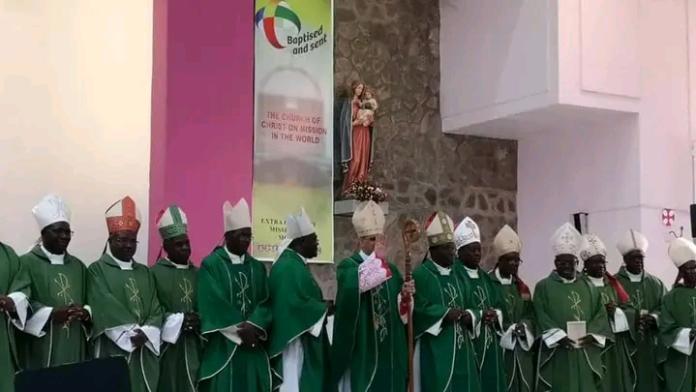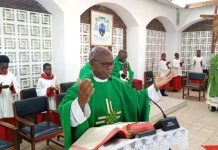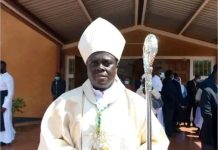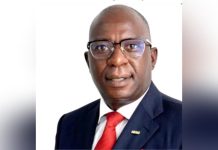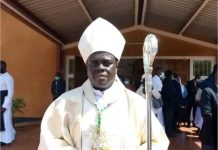Africa-Press – Zambia. The Catholic Church in Zambia has an intelligence network superior to that of the Zambian government intelligence agencies.
This is one of the reasons the Catholic Church is arguably the most powerful organisation in Zambia.
This is what renders its pronouncements on governance issues not merely moral commentary but vital, well-informed geopolitical assessments.
This perspective hinges on the Catholic Church’s unique structural proximity to the people, enabling it to gather granular, ground-level data that formal Zambian government apparatuses often miss or wilfully ignore.
When the Catholic hierarchy speaks out against practices that threaten democracy and risk anarchy like what Priests, Bishops and Catholic organisations are doing now against the unconstitutional amendment process or Bill 7, it does so from a foundation of sound, decentralised, top-notch intelligence, making its voice a legitimate and essential barometer for any responsible government.
The core of this argument lies in the formidable Catholic Church’s organisational architecture – the best in the world.
Unlike the Zambian intelligence agencies, which operate through hierarchical, often clandestine channels reliant on formal reporting, the Catholic Church’s structure is deeply embedded within the lived reality of the Zambian people. Archdioceses, dioceses, parishes, pastoral ministries within the government structure, lay groups, and countless outstations form a continuous, organic network extending into the most remote corners of Zambia.
This solid structure facilitates an informal, yet constant, flow of information regarding social grievances, economic hardships, and instances of administrative malpractice.
Bishops, Priests and catechists serve as trusted intermediaries, individuals whose perceived impartiality often grants them access to truths that citizens would be hesitant to share with government officials or State agents fearing reprisal.
Besides, Catholic Bishops and Priests possess privileged information derived from the penitent’s spiritual accounting, information that they cannot share with anyone, under any circumstances, due to the severity of the inviolable principle known as the Seal of Confession. And some of these penitents operate at the centre of Statecraft.
This proximity creates a repository of tacit knowledge concerning community stability, resource allocation fairness, and localised political tensions that surpasses the capacity of the already technologically backward Zambian intelligence-gathering operation.
Zambian intelligence agencies, by their nature, are often susceptible to instrumentalisation. Their focus tends to be securitised, prioritising threats to the ruling power rather than holistic societal well-being.
Reports that filter up the State chain are subject to political filtering, which is intended to either inflate perceived successes for President Hakainde Hichilema or downplay destabilising realities in order to maintain a positive narrative for the executive, as seen in Chingola, where President Hichilema was stoned and had to be whisked away.
In contrast, the Catholic Church’s mandate, grounded in its Gospel teachings, obligates it to emphasise truth, justice, and the common good—one of the reasons its intelligence system surpasses that of the Zambian government.
This orientation naturally steers its intelligence gathering toward monitoring the health of the social contract.
If you were unaware, when the Zambian Conference of Catholic Bishops issues a pastoral letter or statement on the constitutional amendment process, electoral integrity, corruption, tribalism, or violence, it is synthesising thousands of localised intelligence observations or reports, some of which come from State intelligence reports on President Hichilema’s desk at State House, rather than simply reacting to high-level political gossip.
This is one of the reasons the State panics whenever the Catholic Bishops issue a pastoral letter or statement.
The implications of the Catholic Church’s superior intelligence-gathering capability are profound for effective governance.
A government that ignores the Catholic Church’s warnings like what President Hichilema’s administration has been doing, does so at its peril, effectively choosing to operate blindfolded while relying on a potentially biased internal dashboard.
Consider previous periods in Zambia marked by heightened political tensions, such as the authoritarian tendencies during Kenneth Kaunda’s regime, the unconstitutional third-term campaign during Frederick Chiluba’s administration, disputes arising from closely contested elections, or the political violence in Mongu during Rupiah Banda’s tenure. Often, the early signs of potential unrest—the subtle shifts in community trust, the hardening of opposing viewpoints, the localised economic despair fuelling anger—are first articulated through pastoral letters or Bishop statements.
By the time these issues register as quantifiable threats on the State intelligence radar, the situation has already passed the point of easy de-escalation.
Therefore, listening to the Catholic Church becomes a proactive measure of risk management, ensuring that governance remains attuned to the genuine needs and frustrations of the governed majority.
Furthermore, the Catholic Church’s legitimacy as a voice of the people is reinforced by its moral authority. In many Zambian contexts, the Church, especially the Conference of Bishops, stands as one of the few institutions capable of mediating societal divides. Its interventions are not viewed as partisan lobbying but as essential custodianship of national values.
This unique moral capital of the Catholic Church grants its intelligence analysis significant weight.
When the Catholic Church critiques poor governance practices or illegal constitutional amendments that risk destroying democracy and causing anarchy, it is issuing a warning based on an assessment of irreversible social breakdown, an assessment derived from its unparalleled grassroots presence.
We hold a strong view that the structural and moral framework of the Catholic Church in Zambia grants it a unique, arguably superior, form of societal intelligence compared to State agencies. Its deep integration across dioceses, parishes, outstations, small Christian communities, lay groups, and pastoral ministries within government organs ensures a continuous, unfiltered stream of information concerning the nation’s pulse.
If President Hichilema’s government is committed to stability and true democratic health, recognising the Catholic Church not as a political competitor but as an indispensable early warning system is crucial.
To disregard the Catholic Church’s carefully articulated concerns regarding governance is to wilfully reject the most comprehensive assessment available of the dangers that lie beneath the surface of official reports, thereby increasing the very risk of anarchy it seeks to avert.
Any government that wages war against the Catholic Church for criticising poor governance is ultimately fighting itself and thus engaging in a losing battle.
For More News And Analysis About Zambia Follow Africa-Press


